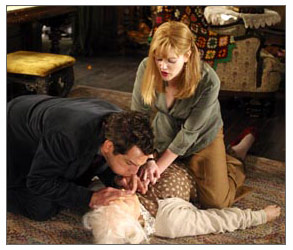New York, New York, it’s a wonderful town. The Bronx is up, and the Battery’s down. When the people aren’t riding in a hole in the ground, they’re comparing the size, layout and architectural details of their apartments with those of their friends, neighbors and co-workers. In New York, real-estate envy isn’t just a hobby; it’s a full-time preoccupation.
In “Duplex,” director Danny DeVito (working from a lively, well-tuned script by Larry Doyle) understands that envy perfectly, and he hitches his movie right up to its evil energy current. Ben Stiller and Drew Barrymore play a reasonably secure (but not exactly well-off) couple who take the seemingly brave step of leaving the island of Manhattan to purchase a stunning brownstone duplex in Brooklyn. The joint has three working fireplaces (when having even one is enough to make all but your closest friends hate you forever), a stained-glass window that would look right at home in an uptown mansion out of Edith Wharton, and a whole wall of built-in oak bookshelves for Stiller’s collection of first-edition novels (he’s a writer). This property isn’t just fabulous by New York standards; it’s fabulous, period. Barrymore and Stiller, a nice young married couple who work hard for their money, surely deserve such a lovely place to live. But not more than you or I do, dammit. Other people’s good fortune is all well and good, except for one thing: It’s happening to other people.
Luckily, Stiller and Barrymore have also inherited an upstairs tenant, an allegedly sweet 99-year-old (or thereabouts) lady played with devilish nastiness by Eileen Essell. An apple doll with an Irish brogue, this cutie from senior-citizen hell pays $88 a month in rent, can’t be evicted because of rent-control laws, and spends her endless idle hours coming up with little chores for Stiller to do, even though he’s supposed to be hunkered down and working on his novel, which is due in a matter of weeks. In short, she turns Stiller and Barrymore’s life into a living nightmare. And even as you’re laughing sympathetically at their trials and tribulations, cackling in disbelief at the abuses they suffer at the hands of this ghoulish geriatric, ostensibly feeling their pain as their dream home crumbles (quite literally) around them, deep down, in your heart of hearts, you’re thinking: Good!
One of DeVito’s gifts as a director is that he understands the pure pleasure of nastiness. Unfortunately, he doesn’t always recognize that that nastiness has to flow smooth and sweet, like warm honey: His last picture, “Death to Smoochy,” was too forced and calculated to succeed on any level. But once in a while, he hits it right. His 1996 adaptation of Roald Dahl’s “Matilda” sails by on a cloud of lovely mischievousness. And although “Duplex” is a very different movie, it’s easy to see how it springs from that same twisted vision.
DeVito understands the dueling chambers of our hearts — there’s the side that wants everything to be nicey-nice and the side that’s charred and black like coal. He not only allows but encourages our conflicted feelings: We alternately want to slug Stiller and Barrymore and cheer for them. How can we not feel sympathy for Stiller when, while helping the wicked ancient one by lugging her rotting garbage downstairs for her, he somehow gets caught “sniffing” a pair of her giant cotton old-lady undies? Later, when she knocks on his door for the millionth time to ask him for some seemingly tiny favor (like escorting her to the pharmacy, where she counts every one of the pills in her prescription before leaving the counter), he explains to her patiently that even though he’s home all day, he really needs to work. She says she understands and, with a compliant and hurt gleam in her eye, turns to go, but not before revealing that she’s bought one of his novels and wants him to autograph it. Understandably touched, Stiller agrees; when he opens the book, there’s a giant orange “99 cents” sticker on the inside flap.
That’s just the beginning of the mess, and DeVito piles one calamity atop another until the whole enterprise threatens to topple. As the old lady’s requests and demands become more outlandish, the couple’s schemes to outwit her escalate accordingly. DeVito occasionally loses control of the chaos — there are a few sequences that are so cartoonish they break the movie’s darkly funny malevolent spell — but he always manages to regain his footing. He encourages his actors’ darkest thoughts to run free, and their performances are accordingly loose and lively. Stiller pulls off some wonderful physical comedy: We catch him doing an impromptu Egyptian shimmy when, after sneaking into the old lady’s apartment (illegally, of course), he realizes he needs to whisk himself out of sight. And Barrymore’s twinkly, flirtatious charm gets funnier as it gets darker. Her eyes glitter and gleam brightest when she confesses her most unthinkable fantasies about offing the aged albatross.
Stiller and Barrymore are sympathetic urbanite monsters, people we think we might like to be friends with, although deep down, we’re really glad we aren’t. Their performances fit deliciously into DeVito’s vision — they understand that he’s really a cockeyed humanist. “Duplex” draws out the worst in us, making us laugh even when we know we shouldn’t. We like Stiller and Barrymore, but we’re envious of them too, and envy, as we all know, is one of the seven deadly sins. Funny how when you’re seething with it, at least you know you’re fully alive.

